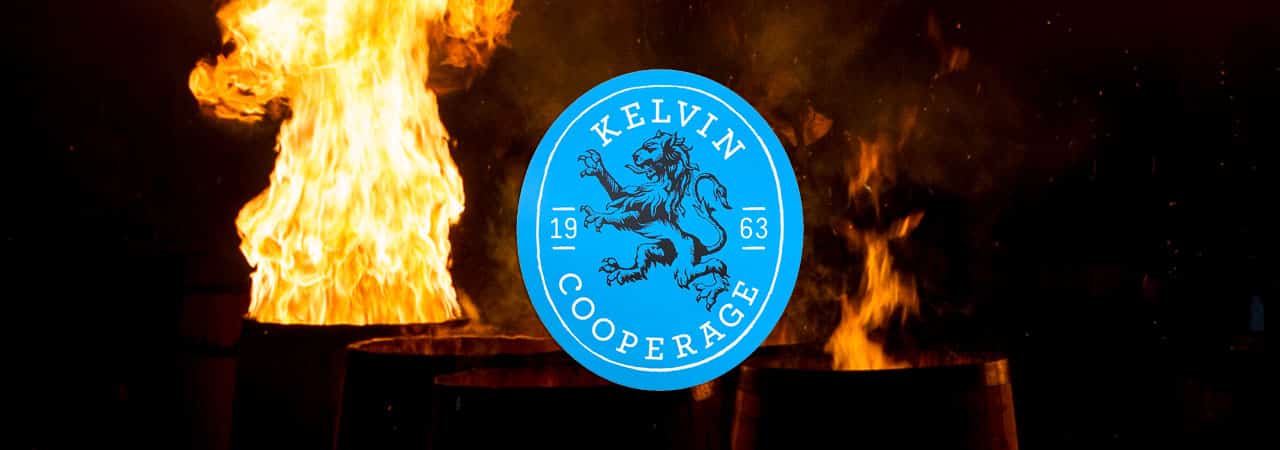Kelvin Cooperage: The Best Damn Cooperage Tour Ever
Back in 1963, after completing his five-year apprenticeship, Ed McLaughlin started his cooperage. Kelvin Cooperage has been a family-run business ever since. It began on the banks of the River Kelvin in Glasgow, Scotland and now resides in Louisville, Kentucky.

Today’s post is the first in a series recapping Bourbon & Banter’s 5th Anniversary Pilgrimage to Kentucky. We hope you enjoy learning a bit more about our trip and the wonderful people and places we met along the way. And of course, we’d love for you to make your own pilgrimage to Kentucky as soon as possible if you haven’t done so already. As always, thanks for being a part of our bourbon journey and spending time with us to see what we’ve got to say. Special thanks to Paul McLaughlin for taking time out of his busy day to give us a personal tour of the cooperage. Cheers! ~ Pops
Back in 1963, after completing his five-year apprenticeship, Ed McLaughlin started his cooperage. Kelvin Cooperage has been a family-run business ever since. It began on the banks of the River Kelvin in Glasgow, Scotland and now resides in Louisville, Kentucky. While in Glasgow, Kelvin provided barrels to many major distilleries in Scotland, Ireland, and worldwide. In 1991, they relocated to Kentucky to be closer to Bourbon country and the finest American oak. Kevin, Ed’s eldest son – who also did an apprenticeship in Scotland – and his younger brother, Paul, currently run the cooperage.

One Kentucky statistic we hear so often is; “there are more barrels of bourbon in the state of Kentucky than there are people.” Some of the new rickhouses can hold upwards of 55,000 barrels. Many people enjoy bourbon but don’t think about where and how the barrels come to be in existence. This job falls into the hands of coopers. These guys are unsung heroes of the whiskey world. On our tour of Kelvin, we got to see the coopers in their element, doing what they all love. If it were not for them, we would not be able to enjoy the whiskey and bourbon we love.
There are many critical parts to producing each barrel so that, when it all comes together correctly, a barrel can hold liquid for many years. Machinery has taken over some aspects of the industry, but coopers are still true craftsman. Precision and limited waste are crucial, and it is incredible to see the guys work at a fast pace while being as efficient as possible.

At the cooperage, barrels are raised by hand with hand-selected staves. Once raised, hoops are added that are handmade as well; rolled steel is brought into the cooperage and turned into hoops every day. After the barrels are raised, they get heated and shaped into a barrel, then off to be charred. Something Kelvin does differently than some of the other cooperages is firing their barrels over real wood fires for both toasting and charring. It is impressive to watch! There is no better smell than the scent of a barrel getting its char.

After barrels are charred, they get rolled down the line where tops and bottoms are put on the barrel, and then it’s off to be checked for leaks. The speed at which they can toss the barrels around and fix issues is awe-inspiring, mastery at its finest. Several of the coopers at Kelvin have been there for 15-20 years, passing their knowledge of the trade to other family members and sometimes their sons. It was a privilege getting to watch them up close to see how it is all done.
While Kelvin Cooperage does make new barrels, this only makes up around 30% of their business. The other 70% is dealing with used bourbon and wine barrels. Of the roughly seventy percent recycled barrels, 10% come from the wine industry, and the other 90% comes from what we all know and love, bourbon. All of the used barrels are inspected, repaired if needed, and then shipped all over the world, mostly to Scotland and Ireland. With the growing popularity of bourbon in the United States, around 10 – 15% of Kelvin’s used bourbon barrels stay stateside and go into the craft market, mostly for barrel aged beer.

Kelvin does not offer public tours, but if you get the chance to tour a cooperage, I would recommend you take the opportunity. To have the chance to see barrels being built is an honor and touring Kelvin Cooperage was by far the best cooperage I have ever seen in production. The employees and staff all have a real passion for the cooper’s trade and are following the traditions of barrel making that have made Kelvin successful for over 50 years.
